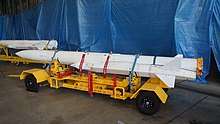ASM-3
The ASM-3 is an supersonic anti-ship missile being developed by Mitsubishi Heavy Industries to replace the ASM-1 and ASM-2 missiles. The major launch platform is the Mitsubishi F-2. Planned Initial Operational Capability was 2016. The missile will be used by the Japan Air Self-Defense Force.
| XASM-3 | |
|---|---|
 XASM-3-E (fixed combustion test model) left rear view at Gifu Air Field | |
| Type | Anti-ship missile |
| Place of origin | Japan |
| Service history | |
| Used by | Japan Air Self-Defense Force |
| Production history | |
| Manufacturer | Mitsubishi Heavy Industries |
| Specifications | |
| Mass | 900 kg (2,000 lb) |
| Length | 5.25 m (17.2 ft) |
| Engine | Integral Rocket Ramjet |
Operational range | Original: 150–200 km (81–108 nmi; 93–124 mi) Extended Range: 400 km (220 nmi; 250 mi) |
| Maximum speed | Mach 3+ |
Guidance system | Inertial/GPS, mid-course correction terminal guidance: Active radar homing/Passive radar guidance |
Launch platform | Mitsubishi F-2 |
In November 2015, Japan's Ministry of Defense announced it would conduct a live-fire experiment of the XASM-3 in 2016, targeting the decommissioned ship JDS Shirane. In February 2017, an F-2 carried out a jettison test of the missile as a precursor to a live firing.[2][3] Mass production was planned to begin in 2018 but stopped due to the further upgrade program has been planned.[4] Footage of a test launch was released in August 2017.[5]
Improvement program
In March 2019, it was reported that the ASM-3 would have its range extended to 400 km (220 nmi; 250 mi) or more.[6][7][8] Despite its development being completed in 2017 the missile was not deployed because its range (200 km) was deemed too short. The extended range is believed to be developed in response to countering the Chinese Navy's long range air-defense. The missile may be used by the F-2's successor once the aircraft retires in the 2030s.[9][10]
In December 2019, the Japanese Defense Ministry secured ¥10.3 billion to upgrade the missile in the 2020 budget.[11] It is planned to extend the range without resizing.[12]
Variants
- ASM-3 Kai(改) - An extended range version.
See also
- Missile designation
Related development
Related lists
- Type 80 Air-to-Ship Missile
- Type 88 Surface-to-Ship Missile
- Type 90 Ship-to-Ship Missile
- Type 93 Air-to-Ship Missile
Comparable missiles
- Kh-31
- Kh-41
- Kh-61
- YJ-91
- YJ-12
- Hsiung Feng III
- ANS (anti navire supersonique, cancelled French project)
| Wikimedia Commons has media related to JASDF ASM-3. |
References
- Japan May Have Tested its New XASM-3 Supersonic Anti-Ship Missile for the First Time - Navyrecognition.com, 4 March 2017
- Japan denies reports it test-fired XASM-3 missile - Defensenews.com, 9 March 2017
- Japan to Produce and Procure XASM-3 Supersonic Anti-Ship Missile in 2018 - Navyrecognition.com, 19 July 2017
- Video: Japan's XASM-3 Supersonic Anti-Ship Missile Test Launch - Navyrecognition.com, 2 August 2017
- Japan to develop long-range, air-to-ship cruise missiles. The Japan Times. 18 March 2019.
- http://aviationweek.com/awindefense/japan-extend-range-asm-3-anti-ship-missile
- https://www.janes.com/article/87346/japan-to-develop-long-range-air-to-surface-cruise-missiles
- "Japan plans to develop home-made long-range anti-ship missile to counter threat". The Japan Times. 24 March 2019. Retrieved 24 March 2019.
- "Japan announces longer-range cruise missile development". The Mainichi. 19 March 2019. Retrieved 24 March 2019.
- Defence Programs and Budget of Japan 2020(Japanese), page.15 - ,Ministry of Defense (Japan), 16 December 2019
- Policy evaluation overview for ASM-3 (改)(Japanese) - ,Ministry of Defense (Japan), 4 September 2019